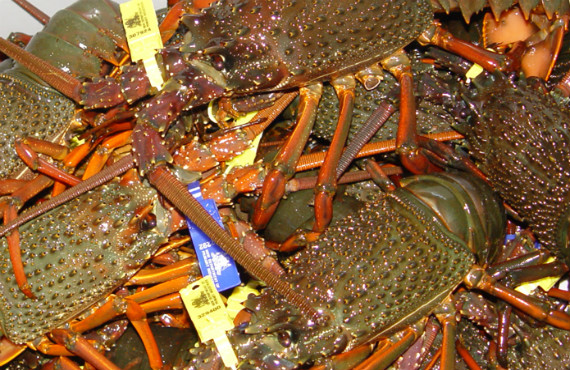
Operation Talon - Four men given millions of reasons not to illegally fish
14 Dec 2017

The biggest fines ever issued in NSW for illegal fishing have been handed down in a Sydney court, with three men, a company and a Wollongong seafood restaurant heavily penalised.
NSW Department of Primary Industries (NSW DPI) Director Fisheries Compliance, Patrick Tully, said the three men, the company and the Illawarra seafood restaurant were charged as part of Operation Talon, targeting the theft and illegal sale of thousands of dollars worth of Eastern Rock Lobster.
One man was sentenced to imprisonment for at least two years and another received a 12 month suspended sentence. Collectively the illegal syndicate face up to two and half million dollars in fines, court costs and forfeiture of valuable lobster fishing shares for hundreds of offences dating back to 2012.
“Collectively the illegal syndicate were found guilty of 217 offences as a result of the sixth month long Operation Talon which started in late 2013, however through further investigations, offences were identified as far back to 2012,” Mr Tully said.
“The men and businesses, including a commercial lobster fisherman, the company that owned the fishing business, a chef as well as the restaurant were found guilty of exceeding the possession limit for Eastern Rock Lobsters, possessing fish illegally taken, receiving fish for commercial use without being registered and trafficking an indictable species of fish. The offences relate to around a tonne of rock lobsters purchased by the company on numerous occasions over an 18 month period between 2013 and 2014.
“The court heard that the fisherman deliberately overfished the species, deliberately failed to record his catch and then on-sold the illegally fished lobsters in a bid to systematically avoid fisheries management regulations.
“The 50 year old commercial fisher previously from Wollongong was fined $76000 and ordered to pay $250,000 in costs for offences including falsifying log book entries intentionally declaring fewer rock lobsters than he caught and then selling the difference illegally to the restaurant on a number of occasions. He was also found guilty of failing to tag commercial caught rock lobsters on a number of occasions as required by NSW DPI and also reusing tags to falsify catch.
“The fisherman was convicted of 10 counts of trafficking in an indictable species of fish, in addition to 96 other offences. In addition to his fines, he was sentenced to a maximum three years in jail and a non-parole period of two years.
The company that owned the fishing business was fined $378,000 and was also ordered by the court to forfeit all its shares in the lobster fishery, which could be worth around one million dollars. In addition to this it was ordered to pay $70000 in costs.
“The restaurant was charged with a 30 offences including receiving fish for commercial use without being registered and trafficking an indictable species of fish and were fined $398,000. They were also ordered to pay $150,000 in costs.
“NSW DPI Fisheries officers conducted months of covert surveillance and used GPS vessel movement data, daily catch log sheets, trap records, tax invoices and financial records.
“This is a resounding result for DPI Fisheries officers who have worked hard on this case for several years. It’s also a win for the hard working commercial fishers who fish legally and responsibly throughout the state.”
Each year about 850,000 recreational anglers fish along our State’s 2,000 kilometres of coastline, as well as in our thousands of kilometres of inland rivers and hundreds of dams and lakes. The State’s commercial fisheries are carefully managed to ensure top quality NSW seafood is available to the community including those who can’t or don’t want to catch their own. The sustainability and economic value these fisheries bring rely of everyone observing the rules.
The vast majority of fishers do the right thing, however, for those that don’t; NSW DPI Fisheries Officers will not hesitate to bring illegal fishers before the courts where they can expect to face severe consequences.
Today's court result is testament to the hard work of these officers and the impact such illegal fishing has on the community.
Stopping illegal fishing activities and protecting the State’s fish habitats is crucial to ensuring we conserve this popular outdoor recreational activity for generations to come.
Media contact: (02) 6391 3686

